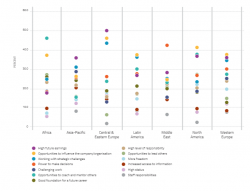
For the last decade or so, it seems that just about everyone has been talking about the millennial generation. They’re spoiled, they’re lazy. They shirk responsibility while also demanding rapid career advancement. They’re idealists, they have unrealistic expectations about work, they never grow up. They want work/life balance, they crave feedback, they quickly jump from job to job.
There is a lot of information out there, as well as a lot of stereotypes — and for many of you who recruit, hire, and work alongside millennials, you’ve probably experienced some of this first hand. You’ve probably also experienced another side of millennials — one that is eager, quick thinking, passionate, and ambitious.
In an effort to get to the root of this generation, Universum, INSEAD, and the HEAD Foundation recently partnered to conduct the largest global survey of millennials. Some of the results confirmed what we already knew to be true — millennials do want work/life balance! — while others revealed some real surprises.
Most striking, though, was how much diversity exists within this generation.
Given how much information is out there, it’s easy to generalize without understanding the nuances that define millennials around the globe, or even within different countries.
They Want to Manage/Lead
One stereotype that you’ve heard before, and will certainly hear again is that millennials are attracted to leadership. Dramatically so — nearly 70 percent of millennials surveyed across the globe say that achieving a managerial or leadership role is important to their careers. This was most important to students in Africa (84 percent) and least important to those in Western Europe (61 percent). It’s likely that as an employer, you are already taking steps to appeal to this preference — but did you know that research reveals that “leadership” means very different things to different people?
What Leadership Means
Leadership embodies many different things across the globe, from what millennials value in their company’s leaders to what they consider most attractive in their own future leadership roles.
When we asked what millennials most value in a manager or leader, 31 percent responded that they value managers who empower their employees. While this was the global average, we saw wide variation in this preference — in Central and Eastern Europe, as well as the Middle East, just 12-13 percent chose that option. In these regions, the most important qualities in a leader were technical or functional expertise in a chosen field (58 percent in Central and Eastern Europe) and a manager who serves as a role model (30 percent in the Middle East).
The sentiment also varies widely when it comes to why millennials want to hold leadership or management roles. While “high future earnings” was the most valued quality overall, it was only the No. 1 choice in Asia-Pacific and Central and Eastern Europe. In Africa, high future earnings was not a top consideration at all — less than 20 percent of respondents selected it as the most attractive aspect of being a leader. Instead, African millennials tended to value having the opportunity to coach and mentor others above all else, followed by having the opportunity to influence the organization.
The Middle East was another outlier, with the vast majority of millennials indicating that having the power to make decisions was the most attractive aspect of a leadership role. Despite more than 40 percent of Middle Eastern millennials selecting this as an attractive quality of leadership positions, it wasn’t even in the top three choices for any other region. Finally, millennials in North America, Latin America, and Western Europe all valued having the opportunity to influence the organization above all else.
What This Means for Employers
Too often, we make assumptions about what candidates want in the workplace without digging in to truly understand what they want. Given the differences that exist from one millennial to the next, employers and recruiters need to approach their target talent groups with a diversified approach. (Learn more about the millennial study to find out what sets this generation apart.)
From diversifying recruitment methods to demystifying stereotypes, understanding this generation will be a critical factor for an organization’s success.